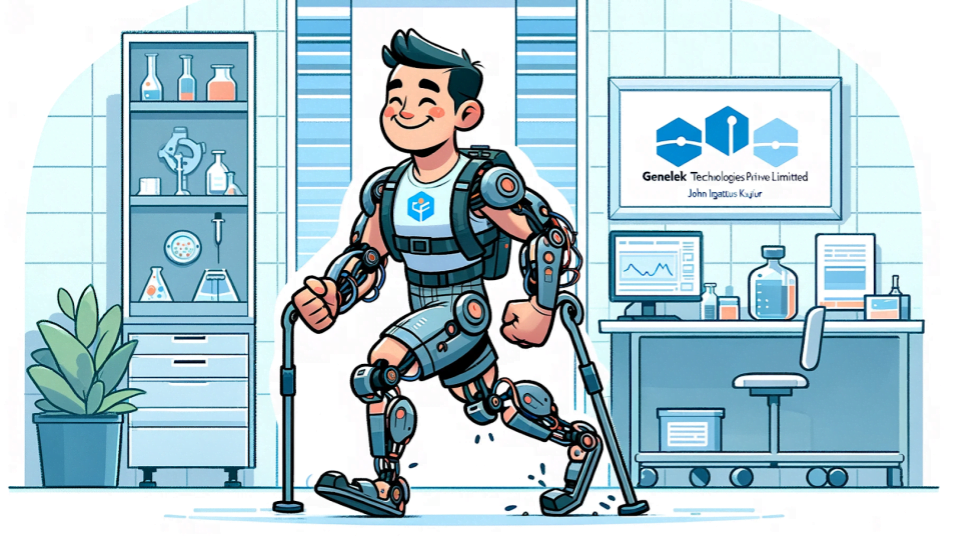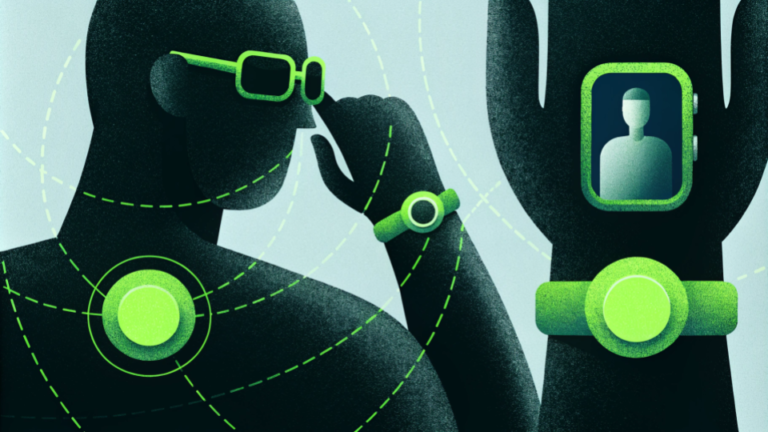John Kujur’s Genelek : A Quest for empathy in innovation

During his final year of engineering at Netaji Subhas Institute of Technology, John Ignatious Kujur’s life took a pivotal turn. This change was sparked not by a technological breakthrough, but by a personal encounter that deeply moved him. Kujur discovered that a senior from his college, hindered by a locomotor disability, was facing significant barriers in finding employment. This revelation struck a chord with Kujur, turning his empathetic response into a catalyst for action. Thus GenElek was born. (GenElek)
Instead of merely sympathizing, Kujur saw this as an opportunity to make a tangible difference through technology. This led him to merge his academic pursuits with a newfound passion for assistive technology. He began experimenting and integrating solutions for specially-abled individuals into his academic projects. This period marked the germination of an idea that would eventually blossom into a significant entrepreneurial venture.
The assistive technology market is undergoing significant growth, driven by a combination of demographic shifts, technological advancements, and increasing governmental support. The global market size is projected to expand from approximately $25.6 billion in 2023 to around $39.1 billion by 2032, demonstrating a steady growth rate. (Assistive Technology (AT) Market | Technavio)
His response to his senior’s struggles highlighted two crucial aspects of his character, pivotal for budding entrepreneurs: deep-seated empathy and a problem-solving mindset. It was this blend of compassion and technical acumen that laid the groundwork for what would later become Genelek Technologies. This early experience is a profound example of how personal encounters can lead to the creation of transformative solutions. This initial spark of empathy and determination would eventually lead to the establishment of Genelek Technologies, marking a significant stride in the field of health-tech innovation.
Bridging Technology and Humanity: The Rise of Genelek Technology
In March 2018, the Indian health-tech landscape witnessed a significant development with the founding of Genelek Technologies Pvt Ltd. Co-founded by John Kujur and Vivek Pandey, this company emerged as a shining example of innovation in New Delhi, India. With a clear mission to enhance human capabilities and mobility through advanced technology, Genelek Technologies specialized in the field of assistive technologies, particularly in developing robotic exoskeletons. Their focus was on individuals suffering from paralysis, stroke, spinal cord injuries, and other neurological conditions. (John Kujur | Linkedin) (Vivek Pandey | Linkedin)
Genelek Technologies stood out for its vision that extended beyond mere technological advancement. The company was dedicated to exploring every aspect of healthcare and wellness, creating technologies with a profound impact on daily life. Their approach was careful and localized, ensuring that the technology developed not only elevated the standard of living but also enhanced livelihoods within the country. With a team of 11 to 20 employees, Genelek Technologies was driven by the ethos of improving physical work capacity and achieving tasks that were once deemed cumbersome or impossible for individuals with mobility impairments.
This period marked a significant stride in health-tech innovation, as Genelek focused on developing their flagship creation, the Exoskeleton. An externally worn robotic support system, the Exoskeleton was designed to enhance human limbic capabilities. This groundbreaking device aimed to assist individuals with various neurological conditions, embodying the fusion of Artificial Intelligence and robotics. The Exoskeleton was not just a mobility aid; it was a tool that empowered individuals to regain independence and potentially increase their employment opportunities. The core of this technology lay in its ability to read data from multiple sensors, providing essential feedback on the user’s gait, processed by an AI algorithm to adjust the Exoskeleton’s functioning to meet the individual needs of each user.
Redefining Mobility: Genelek’s Exoskeleton Breakthrough
Genelek Technologies’ flagship creation, the Exoskeleton, stands as a marvel in assistive technology, developed after John Kujur’s intensive research since 2015. This externally worn robotic support system is not just a piece of innovative equipment; it represents a significant leap in redefining mobility for individuals with paralysis, stroke, spinal cord injuries, and other neurological conditions. Its lightweight and comfortable design, crucial for extended wear, played a pivotal role in its participation in the Cybathlon 2020, a competition testing the limits of assistive technology. (Cybathlon)
The Exoskeleton’s groundbreaking nature lies in its blend of AI and robotics. It employs an array of sensors to meticulously track the user’s gait, providing critical feedback for its AI algorithm. This algorithm adeptly adjusts the device’s functioning to cater to each individual’s unique needs, enhancing the rehabilitation process. The integration of AI not only improves the user’s mobility but also adapts over time, optimizing assistance based on user interaction.
Another innovative aspect of the Exoskeleton is its use of cloud-based solutions for data analysis. The AI collects and interprets data, which is then sent to the cloud for processing. This system enables the generation of real-time progress reports for doctors, allowing them to adjust treatments more effectively. The Exoskeleton’s battery management system is designed for longer run times per session, and its AI-driven automatic adjustments significantly enhance the effectiveness of treatment, reducing overall rehabilitation time.
Genelek’s commitment to affordability is also noteworthy. Despite its advanced features, the Exoskeleton is priced competitively, approximately 40% lower than similar international products, making this advanced technology more accessible to the Indian market. This strategic pricing, coupled with additional discounts for early customers, highlights Genelek’s dedication to making cutting-edge health technology affordable and accessible.
Beyond Technology: A Vision of Inclusive Healthcare
Genelek Technologies, with its revolutionary Exoskeleton, has transcended the conventional boundaries of technology to embrace a vision of inclusive healthcare. Their approach extends far beyond the technical aspects, aiming to profoundly impact various facets of healthcare and wellness. This vision is evident in their commitment to not just advance technology, but to holistically enhance the quality of life for those with mobility impairments.
The company’s Exoskeleton, a symbol of sophisticated engineering and empathetic design, is revolutionizing physical rehabilitation. Genelek’s innovation isn’t confined to the lab; it extends to real-world applications. They have forged significant collaborations with rehabilitation centers and hospitals, such as the Paraplegic Rehabilitation Center in Mohali and discussions with prominent hospitals like BLK Hospital and Dr. Ram Manohar Lohia Hospital. These partnerships aim to integrate the Exoskeleton into regular rehabilitation programs, offering a new dimension of care for individuals facing mobility challenges.
Genelek’s impact extends beyond national borders. The company gained international recognition by participating in the Cybathlon 2020 competition in Zurich, where their Exoskeleton was showcased in the Powered Exoskeleton Race. This global platform highlighted the Exoskeleton’s capability to assist people in performing daily tasks, emphasizing its potential in improving the lifestyle of the specially-abled worldwide.
Moreover, Genelek’s approach to healthcare is comprehensive. Beyond supplying the Exoskeleton, they actively collaborate with hospitals and NGOs to offer a complete rehabilitation package, which includes access to dedicated medical experts, occupational therapy, and counseling. This comprehensive strategy aids in physical rehabilitation and enhances employability and social integration for Exoskeleton users, thereby contributing significantly to the broader goal of inclusive healthcare.
Lessons for Aspiring Entrepreneurs: The Genelek Blueprint
The journey of Genelek Technologies, under the leadership of John Kujur, offers more than just a narrative of technological triumph. It serves as a rich repository of entrepreneurial wisdom, providing valuable lessons for those looking to embark on their own start-up ventures. These insights are not just theoretical musings but are grounded in the real-world experiences and challenges faced by Kujur and his team.
Starting with Empathy:
At the core of Genelek’s inception was John Kujur’s empathy for the challenges faced by people with mobility impairments. This empathy-driven approach exemplifies how successful businesses can stem from a deep understanding of and connection to the needs of potential customers. For aspiring entrepreneurs, this underscores the importance of grounding business ideas in genuine empathy and societal needs.
Integrating Passion with Profession:
Kujur’s journey highlights the seamless integration of personal passion with professional pursuits. His academic projects laid the groundwork for what would become Genelek Technologies, illustrating how aligning one’s personal interests with their professional career can fuel innovation and drive.
Persistent Innovation and Adaptation:
Genelek’s story is a testament to the power of continuous innovation and adaptation. The development of their Exoskeleton, guided by feedback and technological advancements, showcases the importance of remaining adaptable and responsive to changing market needs and technological possibilities.
Strategic Vision in Pricing and Accessibility:
Genelek’s approach to making their technology accessible and affordable provides a key lesson in strategic market positioning. By pricing their product competitively and focusing on market accessibility, they have demonstrated how businesses can balance financial viability with social impact.
Building Strategic Partnerships:
The success of Genelek Technologies is partly attributed to strategic collaborations with medical institutions and rehabilitation centers. These partnerships have been crucial in enhancing the product’s practical application and reach, highlighting the importance of building relationships and networks for business growth.
Local Manufacturing for Global Impact:
Emphasizing local manufacturing, Genelek Technologies not only contributed to economic self-reliance but also tapped into the national sentiment of ‘Atmanirbhar Bharat’. This strategy illustrates how aligning with larger national or global narratives can bolster a company’s mission and market acceptance.
The entrepreneurial journey of Genelek Technologies and John Kujur is rich with insights for aspiring entrepreneurs. It reminds us that at the intersection of empathy, innovation, and strategic business planning lies the potential for creating impactful and sustainable businesses. These lessons from Genelek’s path are invaluable for those who aspire to make a difference through entrepreneurship, blending technological innovation with a deep commitment to societal betterment.
Conclusion: Embracing a Future of Purpose-Driven Innovation
The narrative of Genelek Technologies and its AI-based Exoskeleton transcends mere technological achievement; it embodies a story rich with vision, determination, and a profound commitment to societal impact. Under the leadership of John Kujur, Genelek Technologies has not only engineered a groundbreaking product but has also set a precedent for future entrepreneurs—a path where innovation melds with empathy, where technology meets human needs, and where business goals are in harmony with social imperatives.
Genelek Technologies showcases how entrepreneurial ventures can drive transformative change. Their journey underscores that the essence of successful innovation lies in the deep understanding of the challenges it aims to solve. This understanding is reflected in their commitment to local manufacturing, and in making their innovations accessible and affordable, aligning with broader economic and social objectives.
For readers interested in exploring more about innovative healthtech startups, our other articles offer a treasure trove of information. Dive into the world of Fertifa, which is revolutionizing fertility care and support in workplace, or explore Plimes, whose cutting-edge wearable technology promises new hope for chronic condition management. Don’t miss our coverage on Oralscan, which is transforming dental cancer diagnostics with its advanced imaging solutions, and learn about Alpha Monitor, which is making strides in dementia care and monitoring. Each of these companies, like Genelek, illustrates the powerful impact of healthtech innovations in addressing critical healthcare challenges, further enriching our understanding of the sector’s potential to enhance lives.
Creative Director – Bejoy Nambi
Content By Dork Company
Art By Dork Company
100 Startups by IIT Madras in 2024: A Landmark Entrepreneurial
IIT Madras, a leader in India’s education and research, embarks on an ambitious journey. In…
Inside Indie Hackers: How a Transparent Community of Founders is
Indie Hackers, established in 2016 by Courtland Allen, is a thriving online community and resource…
Cursor: How 4 MIT Graduates Built the Fastest-Growing AI Startup
Cursor, an AI-powered integrated development environment (IDE), emerged in 2022 as one of the fastest-growing…
Vercel: This Startup Is Quietly Powering the Internet — And
Founded in 2015 by Guillermo Rauch and Naoyuki Kanezawa, Vercel—originally known as Zeit—set out to…
Tella: How This Tiny Team Is Revolutionizing Screen Recording
Tella is a modern screen recording platform built for today’s content creators and video professionals….
CarDekho: How Two IIT Brothers Changed The Way India Bought
CarDekho, a prominent name in the Indian automotive industry, has revolutionized the way people buy,…
Kovai.co: The Startup That Gave ₹14 crore To Its 140
The idea for Kovai.co started when Saravana Kumar, the CEO, was working as a software…




















Leave a Reply
You must be logged in to post a comment.